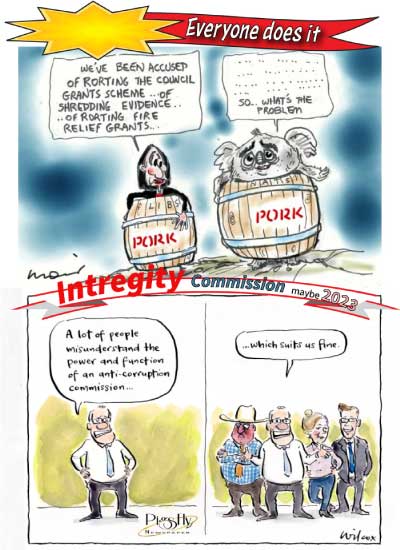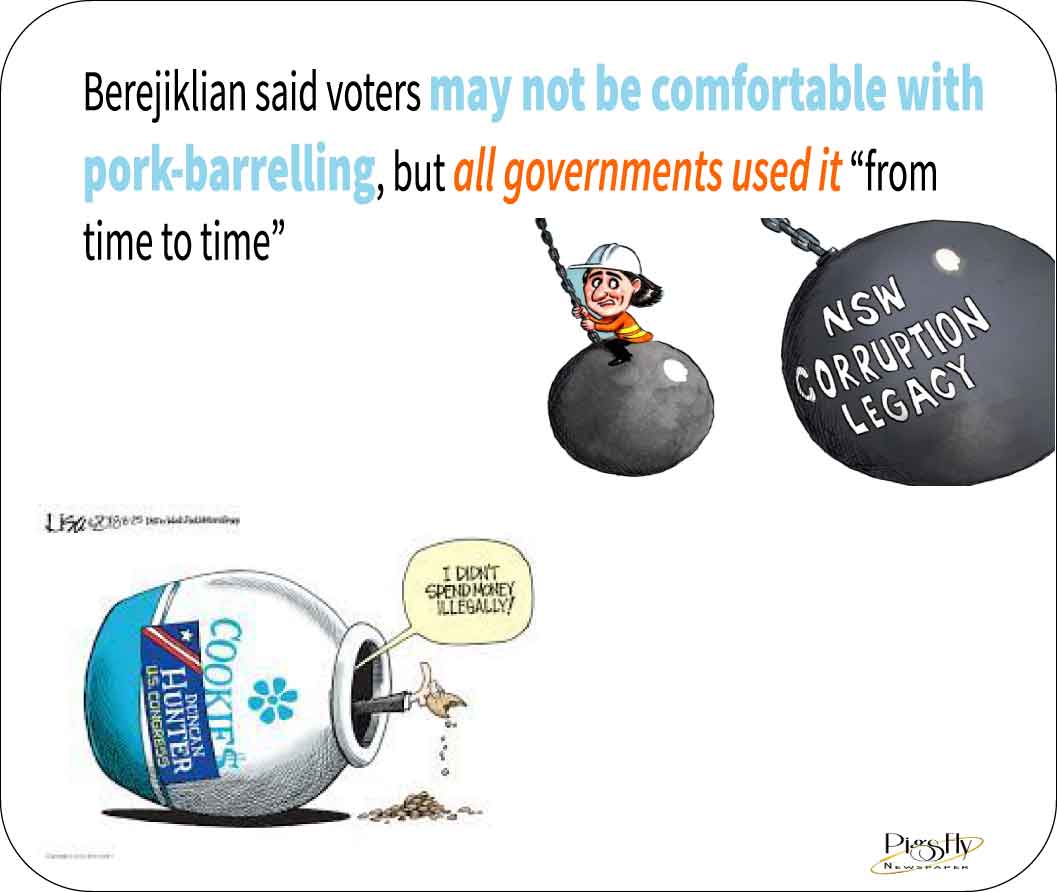

Pork-barrelling ‘a hair’s breadth’ from bribery, ICAC to be told
NSW Independent Commission Against Corruption pork-barrelling has become so blatant it is now ‘‘a hair’s breadth away from the type of electoral corruption and votebuying we traditionally assumed you could never see in Australia’’.
Grants scheme was ‘industrial’ pork-barrelling
An infamous Berejiklian government grants scheme that resulted in millions of dollars flowing mostly to Coalition electorates has been described by the head of the NSW corruption watchdog as blatant, politically motivated porkbarrelling.
Federal government rules against pork-barrelling are significantly more robust than those in NSW, where expenditure of public funds is governed by vague principles instead of clear laws, the state’s corruption watchdog will be told.
An expert will also tell the NSW Independent Commission Against Corruption pork-barrelling has become so blatant it is now ‘‘a hair’s breadth away from the type of electoral corruption and votebuying we traditionally assumed you could never see in Australia’’.
The ICAC will tomorrow hold a special public forum examining whether pork-barrelling is unlawful or unethical, whether it could be considered corrupt conduct under the ICAC Act and whether the rule of law applies to ministerial discretion over grant funding.
The distribution of taxpayerfunded grants to marginal seats has been under the spotlight at state and federal level following a string of scandals involving the $250 million Stronger Communities Fund in NSW, so-called ‘‘sports rorts’’ and commuter car parks.
Constitutional law professor Anne Twomey, who has written a paper at the ICAC’s request, said the Commonwealth had ‘‘much better laws and rules to prevent abuse of power through pork-barrelling [than NSW], although they’re not successful because there are ways of avoiding them’’.
One of those laws was a section of the Public Governance, Performance and Accountability Act compelling ministers to ensure all expenditure was a proper use of the relevant money, she said. But the lack of scrutiny meant pork-barrelling still occurred. Any NSW reforms should add ‘‘impartiality and the public interest’’ to the ministerial obligations and include a mechanism for enforcement, Twomey said.
She said in some circumstances, pork-barrelling could already be considered corruption or even criminal corruption, and would fall within the ICAC’s purview. But the rules and laws were ‘‘extremely complicated’’, leading to confusion.
‘‘The problem in NSW is most of this stuff is not dealt with by law, it’s dealt with by principles,’’ Twomey said. ‘‘That’s all very well, but it doesn’t … give you an answer, in most cases, about what you actually have to do or what you can’t do.’’
A. J. Brown, a professor of public policy and law at Griffith University who will also present to the ICAC, said some pork-barrelling was legitimate. But there appeared to be a growing assumption by MPs and ministers that they had no obligations to public trust when spending taxpayer money, he said.
‘‘The type of pork-barrelling that we’ve increasingly seen [is] a hair’s breadth away from direct electoral bribery – literally vote-buying – of the kind that we know other countries are deeply afflicted by,’’ Brown will tell the ICAC forum.
Michael Koziol writes in The Sydney Morning Herald
This article was first published in the SMH
Independent Commission Against Corruption chief commissioner Peter Hall said the $250 million Stronger Communities fund had clearly crossed “the line”, while another legal expert said the process was an “appalling” indictment on the integrity of the NSW government.
Hall said he believed there needed to be a tightening of pork-barrelling laws.
Independent Commission Against Corruption chief commissioner Peter Hall said the $250 million Stronger Communities fund had clearly crossed “the line”, while another legal expert said the process was an “appalling” indictment on the integrity of the NSW government.
Hall referenced the findings of an NSW auditor-general’s report into the Stronger Communities grants when suggesting its sole motive was political, rather than for the benefit of the community.
“The auditor-general’s report discovered, in that case, a document which is a briefing note in the premier’s office, and that briefing note was to the effect ‘we’ve got the money out the door, and it’s hitting the political target’. You couldn’t have been clearer than that,” he said.
“So that was, you’d almost say, the sole motive, sole purpose of that exercise was political or electoral and that’s clearly on the other side of the line.”







 The
The 
